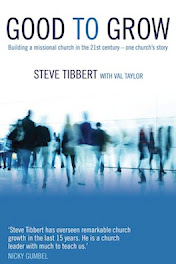If your church size is under
150 the primary way it will grow is through relationship with the senior
leadership, particularly the pastor. The best way for you to reach people, and for
your church to grow in that situation, is for you – the leader – to have people
round to your house. Guys - that is the
best outreach strategy you can follow!
Now, you will also need to run Alpha and provide other things - but the
thing that will really make your church grow is you opening your home. Your
front door could be the door to growth! Running discipleship groups, gathering
young men - these are the ways to grow your church. Become involved with unbelievers, people
making recommitments, new Christians – these are the people I’m talking about. When I first came to King’s I ran the Alpha
course as I wanted to be among those unbelievers.
When you get to a size of around
150 and above then the way you will grow is likely to be through multiplying ministries.
You reach a critical mass where you run a kids’ club or toddler group or something
like debt-counselling. You have all those
different avenues which get you into pools of different people. So that’s what you have to do at that phase
of growth.
The last phase is if you
get over 500-600. The bigger you get,
then your Sunday meeting (or meetings!) becomes THE growth engine. People join your church through that front
door. Of course you will need all these
other things going on that I have already mentioned – toddler groups, Alpha etc. At every stage you need to be aware that the
impact of church size is massive.






